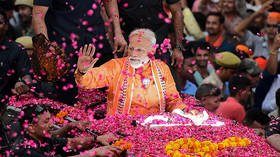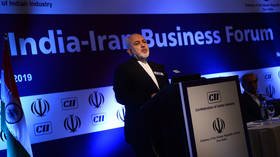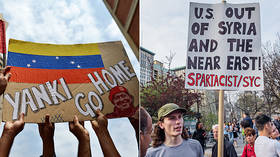Foreign policy gives Modi the edge in India’s elections

By all accounts, India’s general election is Prime Minister Narendra Modi’s to lose.
An average of all the opinion polls conducted on the eve of voting (scheduled in phases between April 11 and May 19) predicted Modi’s ruling Bharatiya Janata Party (BJP) and its allies will win nearly 40 percent of the vote share and more than half of the seats in the Indian Parliament, which would translate into a second term for the incumbent Modi.
The opposition Congress Party and its alliance were projected to get a little over 30 percent of the votes and only one-fourth of the seats, which implies that Modi’s main challenger, Rahul Gandhi, is a long shot for prime minister. With results to be declared on May 23, the likelihood of a massive upset or shock ouster of Modi appears remote.
The reasons for Modi’s frontrunner status are manifold. He has five years of scandal-free governance, a seasoned popular touch and mass media management skills that few public relations gurus can match.
But apart from these advantages, the feverish electoral campaigning across India in the last few months has revealed an additional factor that was historically not a significant determinant of electoral success— foreign policy and national security.
Modi’s international achievements during his first term since 2014 have been harnessed to great effect by the BJP in its electioneering. The branding of Modi as a nationalistic icon who has raised India’s power and prestige in world affairs and secured the country from foes has struck a chord among many Indian voters, especially the urban middle classes.
The BJP has packaged the Modi government’s foreign policy as a series of memorable victories in the international arena and linked it to swelling national pride. Carefully chosen events and moments of Indian triumph or grit in world politics have been turned into classic right-wing memes that emotionally arouse average Indian voters.
On May 1, in the heat of the election campaign, India succeeded in persuading China to shed its decade-long objections to designating the Pakistani jihadist mastermind Maulana Masood Azhar as a global terrorist at the United Nations. The BJP exulted and maximised this accomplishment as proof that Modi alone has the diplomatic prowess to advance Indian interests.
On March 27, when India tested its anti-satellite missile and joined the elite club of the US, China and Russia which possess satellite-killing capability, the BJP went to town with the messaging that only a gutsy and decisive leader like Modi could conduct such a hi-tech missile test, unlike the previous Congress-led Indian government of Manmohan Singh which avoided doing so even though India had the same technical abilities at that time. Election billboards adorning the length and breadth of the country have showcased the BJP’s boast that Modi made India a ‘space power’.
Also on rt.com India joins space ‘super league’ as it shoots down satellite with precision missile – ModiThe BJP’s election campaign has also relied on the refrain of countering India’s age-old scourge of terrorism sponsored from across the border by Pakistan. Since he ordered a daring raid by the Indian Air Force on what India says were terrorist camps deep inside Pakistani territory in February, Modi has popularised the phrase ‘barging into the houses of terrorists and killing them’. His pitch is that India’s past reputation of a ‘soft state’ has been overcome by his paradigm shift in the way the country responds to the jihadist menace.
Opinion polls showed a sharp uptick in the BJP’s election approval ratings after the Indian airstrikes inside Pakistan, indicating that Modi’s national security credentials are pivotal to his political fortunes. The frustrating self-image of India being a sitting duck for years that is now fighting back aggressively against terrorism because Modi is at the helm and takes risks has been an invaluable source of the BJP’s late surge in the election season.
While recent foreign policy and national security developments have been at the forefront of the BJP’s campaigning, it has also tried to take voters back in memory to Modi’s longer-term external act of daring and strategic astuteness.
The surgical strikes against terrorist camps inside Pakistan by the Indian Army in late 2016 that Modi oversaw have been presented as demonstrations of a ‘new India’ that can teach enemies a lesson. The series of international awards and honours conferred on Modi by the governments of Russia, the United Arab Emirates, South Korea, Saudi Arabia, Palestine, Afghanistan, and by the UN, have been circulated as evidence that India has arrived on the world stage with a bang. The improvements in India’s global rankings for ease of doing business, reducing corruption and attracting FDI have also been used to portray Modi as a doer who has the confidence of the international community.
Modi is the only politician who has consistently canvassed voters in this election on the plank of ‘India’s place in the world in the 21st century’. Opposition politicians and media critics who retorted that the BJP was exaggerating his diplomatic and national security performance have been branded as anti-national elements who want to “undermine our armed forces and intelligence agencies.” By consistently painting his rivals as parochial politicians who want to socially fragment India and weaken India’s military, Modi has tactfully monopolised the nationalistic imagination.
In the hotly contested Indian general election, it is obvious that while the BJP has its list of social welfare and economic development claims and promises just like the Congress and other regional parties in the fray, it set itself apart with a heavy focus on foreign policy and national security.
Modi’s assertion that “this election will prove to be the turning point in India’s rise in the world” has few equivalent formulations from the opposition. If Modi storms back to power resoundingly (the BJP’s best-case scenario) or even if he scrapes through with an expanded coalition of allied parties to remain prime minister after May 23, his strategy of tapping into Indians' upward aspiration for international greatness would have made a difference in the outcome.
Of course, there are dangers of raising the hopes of Indians through the electoral pulpit. How far India can go in deterring terrorism and becoming a great power depends on the astuteness with which it handles the USA under the mercurial President Donald Trump and the giant next door China under the redoubtable President Xi Jinping. Continuation of Modi’s first term foreign policy proactiveness as well as fresh initiatives to adjust to a rapidly changing world order will be needed. Once the election is out of the way, the work of recalibrating and executing a grand strategy for India’s global ascent has to accelerate.
Think your friends would be interested? Share this story!
The statements, views and opinions expressed in this column are solely those of the author and do not necessarily represent those of RT.















